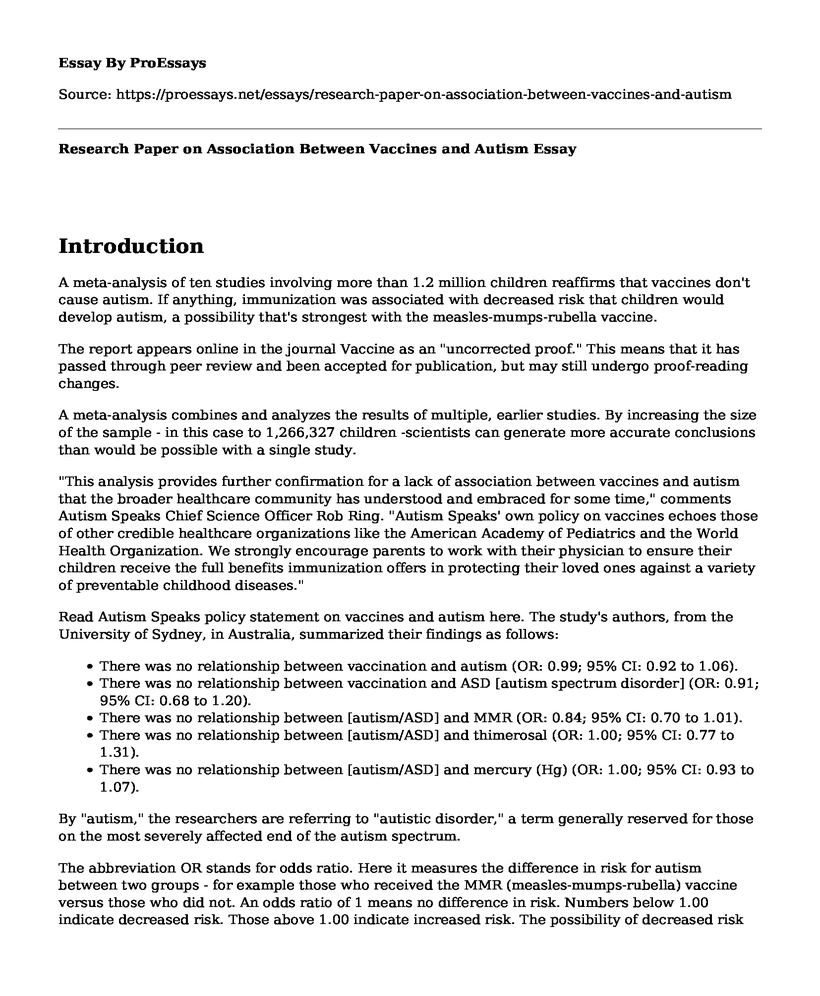Introduction
A meta-analysis of ten studies involving more than 1.2 million children reaffirms that vaccines don't cause autism. If anything, immunization was associated with decreased risk that children would develop autism, a possibility that's strongest with the measles-mumps-rubella vaccine.
The report appears online in the journal Vaccine as an "uncorrected proof." This means that it has passed through peer review and been accepted for publication, but may still undergo proof-reading changes.
A meta-analysis combines and analyzes the results of multiple, earlier studies. By increasing the size of the sample - in this case to 1,266,327 children -scientists can generate more accurate conclusions than would be possible with a single study.
"This analysis provides further confirmation for a lack of association between vaccines and autism that the broader healthcare community has understood and embraced for some time," comments Autism Speaks Chief Science Officer Rob Ring. "Autism Speaks' own policy on vaccines echoes those of other credible healthcare organizations like the American Academy of Pediatrics and the World Health Organization. We strongly encourage parents to work with their physician to ensure their children receive the full benefits immunization offers in protecting their loved ones against a variety of preventable childhood diseases."
Read Autism Speaks policy statement on vaccines and autism here. The study's authors, from the University of Sydney, in Australia, summarized their findings as follows:
- There was no relationship between vaccination and autism (OR: 0.99; 95% CI: 0.92 to 1.06).
- There was no relationship between vaccination and ASD [autism spectrum disorder] (OR: 0.91; 95% CI: 0.68 to 1.20).
- There was no relationship between [autism/ASD] and MMR (OR: 0.84; 95% CI: 0.70 to 1.01).
- There was no relationship between [autism/ASD] and thimerosal (OR: 1.00; 95% CI: 0.77 to 1.31).
- There was no relationship between [autism/ASD] and mercury (Hg) (OR: 1.00; 95% CI: 0.93 to 1.07).
By "autism," the researchers are referring to "autistic disorder," a term generally reserved for those on the most severely affected end of the autism spectrum.
The abbreviation OR stands for odds ratio. Here it measures the difference in risk for autism between two groups - for example those who received the MMR (measles-mumps-rubella) vaccine versus those who did not. An odds ratio of 1 means no difference in risk. Numbers below 1.00 indicate decreased risk. Those above 1.00 indicate increased risk. The possibility of decreased risk was strongest for the MMR vaccine, with an odds ratio of 0.84, or a 16 percent risk reduction.
CI stands for confidence interval, and "95% CI" means that, with 95 percent confidence, the true difference in risk falls within the range of values given. In general, the range of possible values tightens as the size of the total sample studied increases.
"Meta-analysis can be a powerful research approach," comments epidemiologist Michael Rosanoff, Autism Speaks associate director for public health research. "It assesses the quality of data across multiple studies and combines the highest-quality data to give us a 'higher definition picture' of the relationship between potential risk factors and autism." (Rosanoff was not involved in the analysis.)
Acknowledging parents' concerns, one of the three authors added the following epilogue to the report:
As an epidemiologist I believe the data that is presented in this meta-analysis. However, as a parent of three children I have some understanding of the fears associated with reactions and effects of vaccines. My first two children have had febrile seizures after routine vaccinations, one of them a serious event. These events did not stop me from vaccinating my third child, however, I did take some proactive measures to reduce the risk of similar adverse effects. I vaccinated my child in the morning so that we were aware if any early adverse reaction during the day and I also gave my child a dose of paracetamol 30 min before the vaccination was given to reduce any fever that might develop after the injection. As a parent I know my children better than anyone and I equate their seizures to the effects of the vaccination by increasing their body temperature. For parents who do notice a significant change in their child's cognitive function and behaviour after a vaccination I encourage you to report these events immediately to your family physician and...
Cite this page
Research Paper on Association Between Vaccines and Autism. (2022, Oct 28). Retrieved from https://proessays.net/essays/research-paper-on-association-between-vaccines-and-autism
If you are the original author of this essay and no longer wish to have it published on the ProEssays website, please click below to request its removal:
- Essay Sample: Analysis of the Hospital's Project of Free Children's Cancer Screening
- The Diverse Population Course in Nursing Profession - Essay Sample
- Analyzing Bullying Through Literature: Thirteen Reasons Why Essay
- The American Diabetes Association Website Analysis Paper Example
- Essay Example on Netherlands: Standard of Living, Literacy & Healthcare
- Essay Sample on Little Hans' Phobia: Freud's Oedipus Complex Study
- Essay Sample on Fisher's Speech on AIDS: A Whisper of Change at RNC 1992







